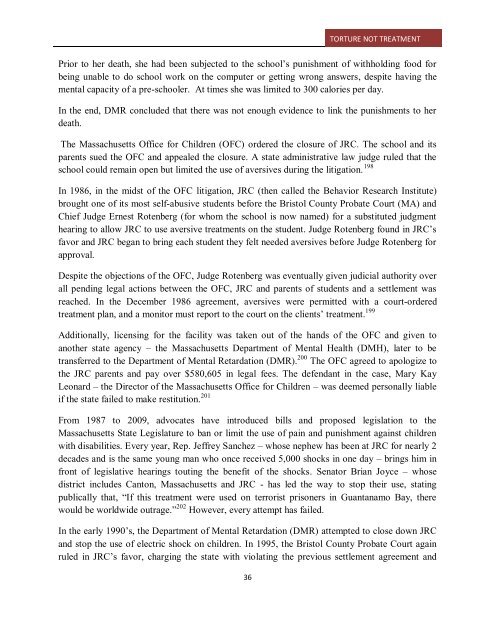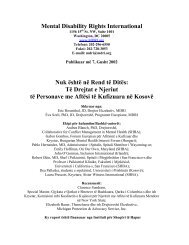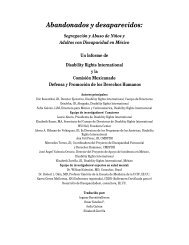Torture not Treatment - Disability Rights International
Torture not Treatment - Disability Rights International
Torture not Treatment - Disability Rights International
You also want an ePaper? Increase the reach of your titles
YUMPU automatically turns print PDFs into web optimized ePapers that Google loves.
TORTURE NOT TREATMENT<br />
Prior to her death, she had been subjected to the school‘s punishment of withholding food for<br />
being unable to do school work on the computer or getting wrong answers, despite having the<br />
mental capacity of a pre-schooler. At times she was limited to 300 calories per day.<br />
In the end, DMR concluded that there was <strong>not</strong> enough evidence to link the punishments to her<br />
death.<br />
The Massachusetts Office for Children (OFC) ordered the closure of JRC. The school and its<br />
parents sued the OFC and appealed the closure. A state administrative law judge ruled that the<br />
school could remain open but limited the use of aversives during the litigation. 198<br />
In 1986, in the midst of the OFC litigation, JRC (then called the Behavior Research Institute)<br />
brought one of its most self-abusive students before the Bristol County Probate Court (MA) and<br />
Chief Judge Ernest Rotenberg (for whom the school is now named) for a substituted judgment<br />
hearing to allow JRC to use aversive treatments on the student. Judge Rotenberg found in JRC‘s<br />
favor and JRC began to bring each student they felt needed aversives before Judge Rotenberg for<br />
approval.<br />
Despite the objections of the OFC, Judge Rotenberg was eventually given judicial authority over<br />
all pending legal actions between the OFC, JRC and parents of students and a settlement was<br />
reached. In the December 1986 agreement, aversives were permitted with a court-ordered<br />
treatment plan, and a monitor must report to the court on the clients‘ treatment. 199<br />
Additionally, licensing for the facility was taken out of the hands of the OFC and given to<br />
a<strong>not</strong>her state agency – the Massachusetts Department of Mental Health (DMH), later to be<br />
transferred to the Department of Mental Retardation (DMR). 200 The OFC agreed to apologize to<br />
the JRC parents and pay over $580,605 in legal fees. The defendant in the case, Mary Kay<br />
Leonard – the Director of the Massachusetts Office for Children – was deemed personally liable<br />
if the state failed to make restitution. 201<br />
From 1987 to 2009, advocates have introduced bills and proposed legislation to the<br />
Massachusetts State Legislature to ban or limit the use of pain and punishment against children<br />
with disabilities. Every year, Rep. Jeffrey Sanchez – whose nephew has been at JRC for nearly 2<br />
decades and is the same young man who once received 5,000 shocks in one day – brings him in<br />
front of legislative hearings touting the benefit of the shocks. Senator Brian Joyce – whose<br />
district includes Canton, Massachusetts and JRC - has led the way to stop their use, stating<br />
publically that, ―If this treatment were used on terrorist prisoners in Guantanamo Bay, there<br />
would be worldwide outrage.‖ 202 However, every attempt has failed.<br />
In the early 1990‘s, the Department of Mental Retardation (DMR) attempted to close down JRC<br />
and stop the use of electric shock on children. In 1995, the Bristol County Probate Court again<br />
ruled in JRC‘s favor, charging the state with violating the previous settlement agreement and<br />
36




